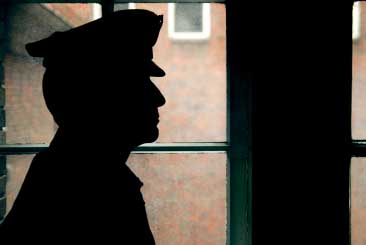|
|
| PTSD = Anxiety (An Opinion) |
| By Ofc. L. Ruiz, Miami Dade Corrections & Rehabilitaiton Department |
| Published: 10/25/2010 |
 Corrections Officer work can be very isolating work. It can be boring for a long time and then in a blink it can become terrifying. To make matters even worse shift work is very unnatural and can have terrible effects on the body. It can disrupt your family life, and take a terrible toll on a person's mental well-being. This is extremely stressful and only adds to the emotional load being carried by a person whose job revolves primarily around a very psychologically and emotionally intense job.
Corrections Officer work can be very isolating work. It can be boring for a long time and then in a blink it can become terrifying. To make matters even worse shift work is very unnatural and can have terrible effects on the body. It can disrupt your family life, and take a terrible toll on a person's mental well-being. This is extremely stressful and only adds to the emotional load being carried by a person whose job revolves primarily around a very psychologically and emotionally intense job.
Post-traumatic stress disorder [PSTD] is a type of anxiety disorder. It can occur after a traumatic event where you were hurt or were threatened with harm or death. PSTD can occur whether you were hurt physically or not. When in danger a person's first reaction is "fight-or-flight;" to fight the threat or to run away from it. When a person is experiencing PSTD this natural reaction can be damaged or changed. There are three categories of symptoms. The first involves re-experiencing the event. Flashbacks are a common association with PSTD. However, reliving the event can also happen in the form of powerful, recurrent memories of the event, or recurring nightmares in which they re-live trauma. Experiencing physical reactions to 'reminders' of the trauma can also disrupt person’s day-to-day lives. The second category is called Avoidance. A traumatized person may simply go emotionally numb. A person will often detach from their emotions, people, and the trauma that they experienced. The inability to not remember the trauma or certain aspects of the trauma isn't unusual. A person experiencing avoidance can also lose interest in normal activities that they once enjoyed and find it hard to feel emotions. This person will avoid any person or place that reminds them of the trauma. Guilt is a very common emotion to feel while intimacy is much harder to come by. The third category is called Arousal. In this category a person will have difficulty concentrating; they often feel scatter-brained. Experiencing exaggerated responses to being startled or frightened is not unusual. Hyper-vigilance can be experienced as mild as double-checking locks, to staying up all night with a loaded weapon waiting for something to happen. Irritability, outbursts of anger and even violence are also experienced. Arousal also creates a great deal of trouble when trying to get to sleep. This is probably the worst symptom of all because the inability to sleep creates even more stress and anxiety in a person. Typical of anxiety, stress, and tension are the following symptoms:
For various reasons most 'healthcare professionals' choose to take the easiest way out of having to actually heal anyone. They've become glorified drug dealers. At no time can this be seen more clearly than when someone is experiencing a mental health related issue. Antidepressants: Antidepressants are prescribed at a frightening rate in our country. Antidepressants affect neurochemical levels in the brain with the intention of altering your mood for the better. Most studies have shown that antidepressants have little if any actual effect, but they are big business and continue to be prescribed. Also, these medications usually come with a wide range of negative side effects. Tranquilizers are also a common PTSD prescribed medication. These drugs are highly addictive and can interfere with other drugs that you may be taking. If you feel that you need something to calm your immediate anxiety and fear levels talk to a qualified medical professional about a natural alternative. Naturopathic Doctors, Osteopaths, and many doctors schooled in Acupuncture can help. There are many herbs that can be taken as a tea, tincture, or pill. One word of caution, like any medication herbs can interfere with other medications. Alternative therapies for PTSD may help you to manage symptoms that come up, but have not yet been proven to work by the medical establishment.
“If people let government decide what foods they eat and what medicines they take, their bodies will soon be in as sorry a state as are the souls of those who live under tyranny.” – Thomas Jefferson (U.S. President) Other articles by Ruiz: |
MARKETPLACE search vendors | advanced search

IN CASE YOU MISSED IT
|


Comments:
No comments have been posted for this article.
Login to let us know what you think